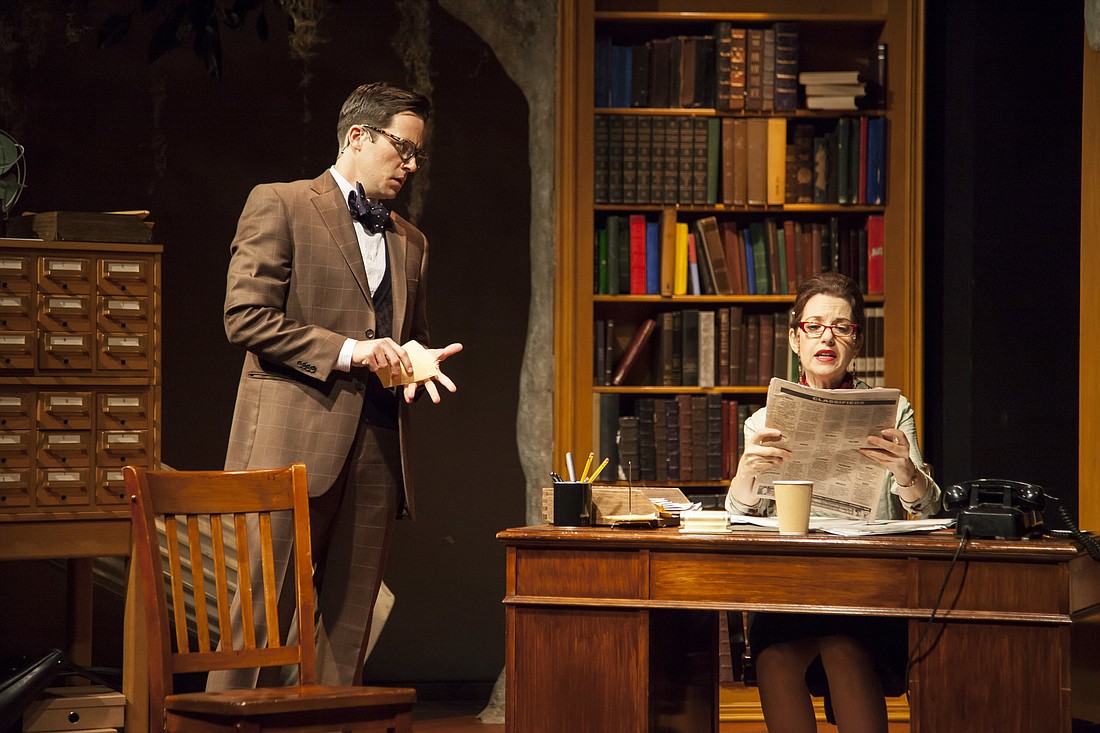- December 13, 2025
-
-
Loading

Loading

Kenneth Jones’ “Alabama Story” unfolds an unlikely parable of racism, reading and rabbits at Florida Studio Theatre. It’s based on a true story. But no less strange for that.
The year is 1959. Garth Williams, the beloved children’s illustrator of “Stuart” Little” and “Charlotte’s Web,” has written and illustrated a new book—“The Rabbits' Wedding.” It showcases the marriage of two rabbits: one white, one black. Alabama’s segregationists see it as subliminal propaganda for interracial marriage and try to ban the book from the Alabama public library system. Emily Wheelock Reed (Jean Tafler), the director of Alabama’s public library service, sees only a charming children’s book and refuses to pull it from the shelves. E.O. Eddins (Andy Prosky), a grandstanding state senator, threatens her library budget, grills her in the Alabama state legislature, and demands her resignation. Reed stands her ground—with one small concession. She takes the book out of general circulation and puts it on a reserved shelf. But other Alabama libraries get to keep their copies—and sales have skyrocketed. Ultimately, Eddins’ bunny book crusade makes Alabama a national joke. He quietly drops it. Reed quietly leaves for a library position in Washington D.C. a year later.
Jones sticks to that basic story. It’s easy to see where the story’s going. But his play is more a series of character studies than a mousetrap plot that springs a surprise on you. Characters taken from life include Reed, Senator Higgins (based on Eddins) and Garth Williams (Kevin Cutts) himself. (The illustrator shares his actual quotations when he’s not wryly commenting on the action of the play.) Jones’ purely fictional characters include Lily (Rachel Moulton) and Joshua (Chris White)—a white woman and a black man, who meet by accident in Montgomery, Ala. They were childhood friends, but violently separated after a pre-adolescent kiss. Jones also dreams up Thomas Franklin (Danny Bernardy), Reed’s reference librarian. He knows about prejudice as a closeted gay man in the unsympathetic South.
Fine performances bring these characters to life. Tafler’s Reed is professional and polite—and won’t be pushed around. She does the right thing and doesn’t back down under threats and personal attack. Bernardy’s Franklin hides his fierce loyalty to her beneath a soft-spoken demeanor. He’s particularly moving in a scene where Reed questions his loyalty. Prosky’s Higgins is a good-old-boy Machiavelli who makes every mellifluous sentence a pull-quote. Cutts’ Williams speaks the blunt truth with a philosopher’s honesty and a Burl Ives twinkle in his eyes. White and Moulton’s characters dance around good and bad memories; a black man who sees too much and a white woman who’s reluctant to see. Both actors nicely convey a sense of what their characters don’t say—the dangerous thoughts and feelings locked up in their minds.
“Alabama Story” begins and ends with an invocation to: “Tell me a story.” Kate Alexander’s taut direction emphasizes the narrative imperative. The six main characters all have stories to tell—or hide. From story to story, Alexander moves us closer to the truth. Isabel and Moriah Curley-Clay’s fluid set design suggests library, legislature and plantation with a few rolling pieces. Montgomery’s Oak Park is the one consistent backdrop: a city park that’s been padlocked in defiance of a Federal integration order. Sara Hinkley’s costumes crisp costumes evoke the characters’ self-possession. Some folks are good, some aren’t so good. But they all want to look good.
The playwright evokes the Deep South of 1959 with spot-on dialog and dialect. Jones has a keen ear for cultivated Southern patois—or a Midwestern librarian trying to talk like a Southerner. His Senator Higgins sounds like a person, not Foghorn Leghorn. That’s always an accomplishment, especially for a playwright based in New York City.
You’ll want to get to know Jones’ characters. The only crusader in the bunch is on the wrong side. The rest quietly do the right thing. They don’t shout about their principles. But they stand on them.